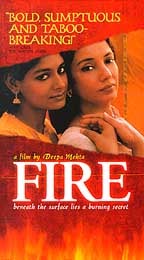Apr 15, 2025
Apr 15, 2025
by V. Radhika
 "Where is the house of male-widows?" asks the eight-year-old, her white saree and recently tonsured head indicating her initiation into widowhood. The silent gaze of the older women sequestered in a widow's hostel says it all: the callousness of a patriarchal society that exiles widows to its fringes.
"Where is the house of male-widows?" asks the eight-year-old, her white saree and recently tonsured head indicating her initiation into widowhood. The silent gaze of the older women sequestered in a widow's hostel says it all: the callousness of a patriarchal society that exiles widows to its fringes.
Deepa Mehta's `Water', which recently opened the 30th Toronto International Film Festival, holds a mirror to a society that judges a woman's worth by the life and death of her husband. Though set in 1938, the film is equally relevant today, as thousands of despondent Hindu widows continue to lead a cloistered existence. All it takes is a visit to the byzantine lanes of the two holy cities for Hindus - Brindavan and Benares (now called Varanasi) - to see the white-robed widows engaged in a daily fight with poverty. Bent with age and solitude, their heads shaven, their foreheads streaked with sandalwood, most of them have been abandoned by their families and have to beg for a living. Chanting devotional songs the whole day is, for most, not just a route for spiritual salvation but also the only means to earn a few pennies.
While they have been the subject of many an article and documentary, `Water' brings them face-to-face with a large mainstream audience. Examining their plight through the historical lens of patriarchy, the film raises questions that move beyond spatial and temporal boundaries and, thereby, the individuals featured in it.
While her earlier film, `Fire' boldly tackled the issue of women's sexuality, `Water' ventures into the turbulent waters of religion/religious scriptures that are used to bolster patriarchy. `Water' begins with an extract from Manusmriti (ancient Hindu text), which details the obligation of a wife to her husband. Sans husband, she has no worth and can only hope for salvation through penance and barricading herself against social spaces so as not to pollute them.
The social barricade obviously has economic overtones too. As one of the film's male protagonists points out, it is an effective measure to keep the widow from claiming a share in the family's property, apart from shirking the financial responsibility of providing for her.
Set in a widow ashram (refuge), `Water' pivots on three principal characters, the middle-aged Shakuntala, the young and beautiful Kalyani and child-widow Chuiya (played by debutant Sri Lankan child actor Sarala). All that Chuiya, like many inmates, remembers of her 'marriage' is the feast. Optimistic that her mother will take her home, she refuses to abide by the ashram's prescribed norms and in the process forces others to confront their own dormant questions and beliefs.
The two women she befriends are polar opposites: young Kalyani, who is forced into prostitution by the ashram head to meet the hostel expenses, and middle-aged Shakuntala, who is caught between her hatred of being a widow and fear of not being a 'proper' one. It is Shakuntala who emerges as the quiet rebel by freeing Kalyani from captivity so she could marry the man of her choice and also Chuiya. All of them break tradition in their own ways.
"The nucleus of `Water' is the conflict between faith (as in a particular religion) and our conscience," says Mehta and this conflict is played out best by Shakuntala (actor Seema Biswas in a riveting performance). The film has bleak and sombre look but that does not take away its anti-establishment punch. The story is a necklace that strings politics, religion, spirituality and women's status.
`Water' ends on an optimistic note with the child widow Chuiya's rescue but only after she has been sexually abused (perhaps an attempt at being realistic).
It is the exploration of multitude dimensions of women's lives that has characterized Mehta's film trilogy 'Fire', `Earth' and `Water'. Each of them questions the predominantly male-defined norms for women. Perhaps that is why she prefers to call them political trilogy rather than elemental trilogy as they are commonly referred to. "`Fire' is about the politics of sexuality, `Earth' is about politics of nationalism and `Water' is about politics of religion," says the Toronto-based filmmaker who has been hounded by Hindu fundamentalists for raising the curtain on hitherto taboo topics. Shiv Sena activists went on a rampage following `Fire's screening (for portraying a lesbian relationship), and later the self-anointed cultural gatekeepers sabotaged the shooting of `Water' five years ago by burning down the sets in Varanasi and issuing death threats to Mehta.
"They (fundamentalist Hindus) didn't know what it was really about. They felt in some way Hindu widows really have an opportunity to do something good by being segregated. By questioning that, I'm (considered to be) defaming Hindu culture. It's not true at all because this is not what pure Hinduism is all about," she says and adds, "just as this protest by a miniscule minority is also not what Hindus or Indians are all about. In these intervening years many Indians have asked 'When are you making `Water'. We want to see it'."
Regarding the powerful portrayal of women in her films, she says, "Women's focus is important. There are not many realistic films on women. I feel women are very strong but we don't have our voices yet. If I can give a voice to women, I would be glad because I think it is important."
02-Oct-2005
More by : V. Radhika